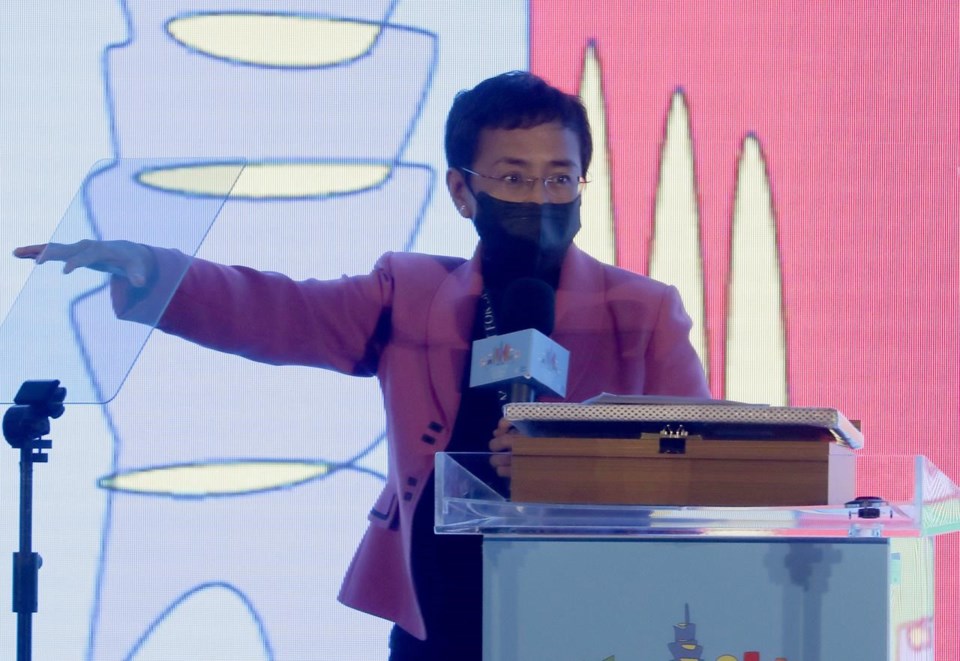TAIPEI, Taiwan (AP) — Taiwan won’t back down in the face of “aggressive threats” from China, the president of the self-governing island democracy said Tuesday, comparing growing pressure from Beijing to Russia's invasion of Ukraine.
Tsai Ing-wen made the comment following a twice-a-decade at which it upped its longstanding threat to annex the island it considers its own territory by force if necessary.
The party added a line to its constitution on “resolutely opposing and deterring” Taiwan’s independence and “resolutely implementing the policy of ‘one country, two systems,'" the formula by which it plans to govern the island in the future.
The blueprint has already been put in place in the , which has seen its democratic system, civil liberties and judicial independence decimated in recent years.
Speaking to an international gathering of pro-democracy activists in Taipei, Tsai said democracies and liberal societies are facing the greatest challenges since the Cold War.
“Russia's unprovoked invasion of Ukraine is a prime example. It shows an authoritarian regime will do whatever it takes to achieve expansionism," Tsai said.
“The people of Taiwan are all too familiar with such aggression. In recent years, Taiwan has been confronted by ," she said, listing military intimidation, cyberattacks and economic coercion.
The rising Chinese pressure has spurred calls in Taiwan for additional defense spending and a lengthening of the term of national service required of all Taiwanese men.
“However, even under constant threats, the people of Taiwan have never shied away from the challenges" and have worked against authoritarian forces looking to undermine their democratic way of life, Tsai said.
Asked about Tsai's comments, Chinese Foreign Ministry spokesperson Wang Wenbin said attempts to maintain an independent Taiwan were “doomed to fail."
“I would like to stress there is no way forward other than reunification for Taiwan," Wang said at a daily briefing in Beijing.
Tsai was speaking at the opening ceremony of the World Movement for Democracy’s steering committee, which is chaired by 2021 Nobel Peace Prize laureate Maria Ressa.
Taiwan and China split amid civil war in 1949 and Taipei enjoys strong U.S. military and political support, despite the lack of formal diplomatic ties.
Despite having just 14 official diplomatic allies, Taiwan has drawn increasing backing from major nations, including Japan, Australia, the U.S., Canada and across Europe.
A recent visit by U.S. House Speaker Nancy Pelosi enraged Beijing, seen as a rehearsal of a blockade of the island.
On Monday, Tsai met with focusing on human rights, which expressed concern about how Taiwan would handle threats from China.
“Taiwan is really facing military threats,” delegation head Peter Heidt said. “From Germany’s point of view, changes to the cross-Strait status quo, if any, must be based on peaceful means. Also, these changes must be made after both sides have reached a consensus.”
Also on Tuesday, Taiwanese Premier You Si-kun met with Ukrainian lawmaker Kira Rudik and Lithuanian politician Zygimantas Pavilionis. Taiwan has strongly condemned the Russian invasion of Ukraine and at least one Taiwanese citizen is reportedly fighting with Ukrainian forces.
Rudik expressed Ukraine's gratitude for Taiwan's financial support and backing of sanctions against Russia. Despite Russian attacks on the country's infrastructure, particularly the electrical grid, “we will win this war. I promise you," she said.
The Ukrainian conflict has focused new attention on whether China might launch military action against Taiwan, given that a solid majority of Taiwanese reject Beijing's calls for “peaceful reunification."
A full-scale invasion across the 160-kilometer (100-mile) -wide Taiwan Strait remains a daunting prospect for China despite its recent massive military expansion, especially of its naval and missile forces.
However, Chinese leader Xi Jinping's has some observers speculating he may be looking to move up the schedule for bringing Taiwan under China's control.
Among the personnel changes at China's congress that concluded Saturday, Gen. He Weidong was elevated to second vice chairman of the Central Military Commission. He was formerly head of the Eastern Theater Command, which would be primarily responsible for operations against Taiwan should hostilities break out.
___
Follow AP’s coverage of the Asia-Pacific region at
The Associated Press




